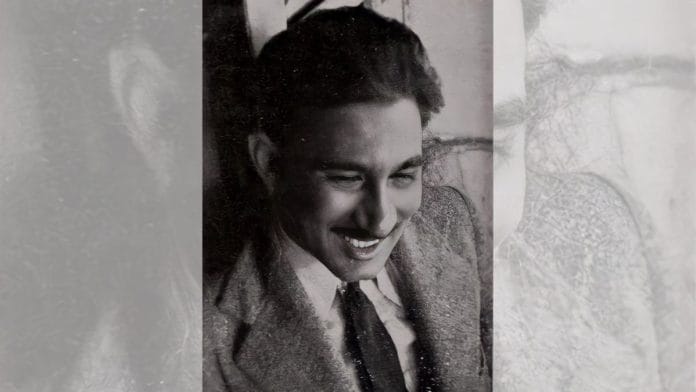Khwaja Ahmad Abbas authored the longest-running column in Indian journalism, ‘Last Page’. A prolific writer who worked with multiple media and languages, Abbas also wrote, directed, and produced Amitabh Bachchan’s Bollywood debut, Saat Hindustani.
He also posed an important and oft-quoted question after the Partition—”Who killed India?” Three decades later, he repeated the question in his autobiography while attempting an answer.
Abbas began writing at the English Weekly, which was started by lawyer-politician Pherozeshah Mehta in 1910. Abbas turned out to be the highlight of the weekly’s silver jubilee year when his notes were part of the edition’s coverage of contemporary issues.
He started writing ‘Last Page’ at The Bombay Chronicle in 1935, the same year he obtained a Bachelor of Law degree from Aligarh Muslim University.
His column shifted to Blitz in 1947 where it continued until his death in 1987. Its translated versions appeared in Hindi and Urdu as ‘Azad Kalam’. He penned over 3,000 articles throughout his career, in addition to more than 70 books, 90 short stories, and 40 films.
A cinematic lens
At the Chronicle, Abbas also worked as a film critic. He subsequently joined the Bombay Talkies as its publicist in 1936 and sold his first screenplay, Naya Sansar, to its owners Himanshu Rai and Devika Rani in 1941. He also wrote India’s only Palme d’Or winner: Neecha Nagar (1946).
He was the writer for some of the best films of showman Raj Kapoor, such as Awara, Shree 420, Mera Naam Joker, Bobby, and Henna. His nephew Anwar Abbas once recalled how Kapoor called him ‘Khwaja’ affectionately. He worked on about 40 films as a writer, director, or producer.
Known for being one of the pioneers of Indian parallel cinema, Abbas filed a petition in the Supreme Court challenging the constitutional validity of pre-censorship on films. This was prompted by his inability to obtain a ‘U’ certificate for his film A Tale of Four Cities (1968), which featured Mumbai’s red-light district. The Supreme Court didn’t rule in Abbas’ favour, but the case set a precedent for others like it.
Abbas was born on 7 June 1914 to a prominent family in Panipat, Haryana (erstwhile Punjab). His paternal grandfather Khwaja Ghulam Abbas was one of the chief rebels of the 1857 Rebellion and was rumoured to be the first martyr blown from the cannon. His maternal great-grandfather was poet Altaf Hussain Hali, a disciple of Mirza Ghalib.
His mother Masroora Khatoon and her father Khwaja Sajjad Husain were notable educationists. Abbas’ father was among the first graduates from the Aligarh Muslim University (AMU). Many of his ancestors had served the education department of the state, but Abbas pledged to avoid it during the Gandhian Satyagraha movement in his student life, and abided by it.
Also read: ‘I refuse your partition’—Faiz to Shankha Ghosh, how Bengali poets captured 1947 violence
Who killed India?
One of Abbas’ nieces, Syeda Hameed, the leader of the Society for Communal Harmony repeated his oft-quoted question, “Who killed India?” Abbas first raised it in his column after witnessing the communally charged atmosphere of his city and the nation in 1947. As mentioned in his autobiography, he described how Mumbai was divided into Hindu Bombay and Muslim Bombay, and how he and his neighbours progressed with the newly formed local Swaraksha Dal (self-defence group) in the Shivaji Park area.
The question was later repeated by the likes of Justice Rajinder Sachar and former Vice President Hamid Ansari, who wrote about the question of social harmony.
In 2015, the question was raised with the introduction of the Social Harmony Pact of 1923. Proponents of the pact believed that indulging in communal misdeeds is a sin in religious terms and it is the duty of co-religionists to resist and ensure peace and harmony.
A decade before his death, Abbas published his autobiography, I Am Not an Island: An Experiment in Autobiography. Writing three decades after the Partition, he repeated the question (but this time his response was not concise like it was before), “India was killed by Britain. The first blow was struck when the British (after ignoring and neglecting them for half a century after the events of 1857) instigated and encouraged the Muslims to demand separate electorates and then conceded it. That was the first step towards Pakistan.”
Abbas then addressed the second culprit, “India was killed by fanatical Muslim Leaguers who played upon the community’s apprehensions and fears to produce in them a peculiar psychosis, which was a dangerous combination of inferiority complex, aggressive jingoism, religious fanaticism and fascistic Herrenvolk legends.”
Abbas found the third culprit in supporters of Hindu exclusiveness, nationalists and congressmen. The fourth and final one he named was the Communist Party of India, which he believed had encouraged the irrational demand for Pakistan.
Because of his writings against the two-nation theory, Abbas was officially blacklisted in Pakistan. As his 110th birth anniversary and the 18th general elections coincide, his words are more resonant now than ever, when we just had an election where most leaders and political parties tried hard to polarise the electorate.
“That an imperialist power planned the dismemberment of our country in the very hour of our freedom is not surprising. The wonder, and the tragedy, is that India should have been killed by the children of India.”
Kaushal Kishore is an environmental activist. He tweets @mrkkjha.
(Edited by Prasanna Bachchhav)






